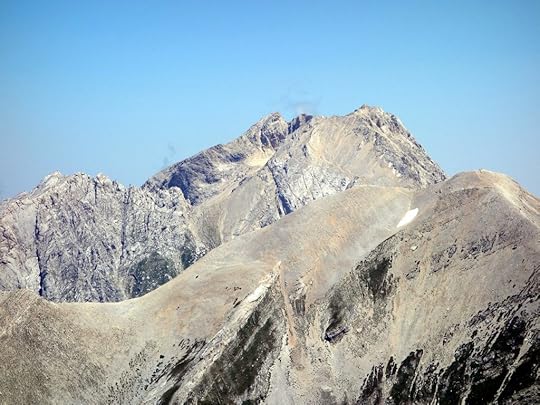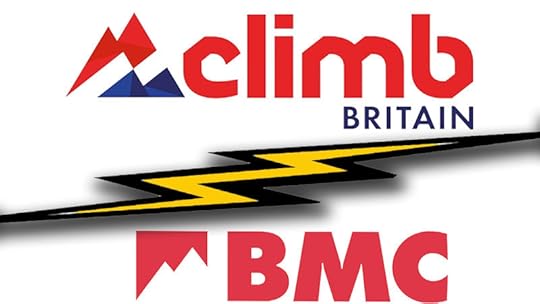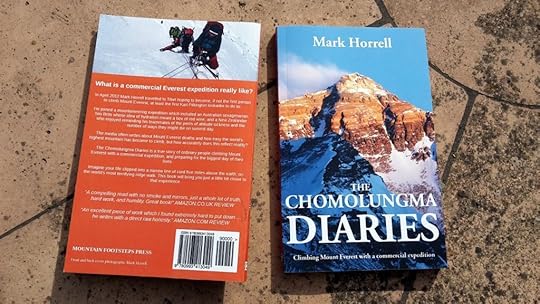Mark Horrell's Blog, page 35
August 24, 2016
Pizzo d’Intermesoli, Gran Sasso’s forgotten sister
It’s not without good reason the highest massif in the Apennines is known as Gran Sasso – the Great Stone. Its height meant that it was the first range we visited. As everybody does, we tried to climb its highest peak, Corno Grande, first. It took us a few attempts, but we got there at the third time of asking.
 The high peaks of Gran Sasso – The Great Stone – Corno Piccolo (behind left), Corno Grande (behind right) and Pizzo d’Intermesoli (front) from the summit of Monte Corvo
The high peaks of Gran Sasso – The Great Stone – Corno Piccolo (behind left), Corno Grande (behind right) and Pizzo d’Intermesoli (front) from the summit of Monte Corvo We have since e...
August 17, 2016
Shipton’s mountain travel classics now available as sensibly priced ebooks
I can’t remember precisely when I first became aware of Eric Shipton’s writing, but I think it may have been 2002, when I was climbing Mt Kenya (or more accurately, trekking to Point Lenana, its third highest summit).
Shipton had a long and significant acquaintance with Mt Kenya. He arrived in Kenya in his early 20s, intending to spend his life as a tea farmer, but the first view he got from his plantation changed all that:
The whole northern horizon was filled with a gigantic cone of purple...
August 10, 2016
Why I don’t give a toss about the BMC renaming itself Climb Britain
Last month Britain’s biggest mountaineering membership organisation, the British Mountaineering Council (BMC), puzzled its 80,000 or so members by announcing completely out of the blue that it would be changing its name to Climb Britain.
 The logos are nice though
The logos are nice though Reaction to this news wasn’t entirely positive. Within a matter of hours a thread had been started on the UK Climbing forums, where baffled BMC members expressed their incredulity. A petition appeared on Change.org demanding the name...
August 3, 2016
The Manaslu Circuit: a bridge lover’s paradise
The Manaslu Circuit Trek website recently reported that the Manaslu Circuit is open for business again after suffering extensive damage in last year’s Nepal earthquake. Tour operator Richard Goodey inspected all the bridges on the trek for signs of damage, paying particular attention to cables and concrete for cracks or deformation. He concluded that all of the bridges were in great condition and safe to cross.
The Manaslu Circuit appears to be one of the success stories of regeneration after...
July 27, 2016
Monte Gorzano, the highest point in Lazio
For most people outside Italy, Lazio is better known as one of Rome’s two football teams: fierce rivals, and the Liverpool to Roma’s Everton (or at the risk of offending anyone Liverpudlian or Roman, the Everton to Roma’s Liverpool). For English fans, it’s the team Paul Gascoigne played for in the 1990s. I sometimes wonder how he settled in. I’m a little slow learning Italian, and I had a head start over Gazza in that at least I arrived being able to speak English.
More generally, Lazio is th...
July 20, 2016
On summit certificates, liaison officers and funny mountaineering rules
In a surprise announcement, The Himalayan Times reported last week that Sherpas who climbed Everest this year will not be receiving summit certificates. This follows reports that a pair of Indian police officers (of all people) did receive summit certificates in exchange for Photoshopping a pair of summit photos.
So what on Earth is going on? Once again, here at the Footsteps on the Mountain blog, I try to shed some light on the bizarre workings of Nepal’s Ministry of Tourism.
 Two Indian poli...
Two Indian poli...
July 13, 2016
Comparing Hillary’s and Tichy’s ascents of Cho Oyu
Ever since I first started taking note of what happened on the 8000m peaks, Cho Oyu (8201m), the sixth highest mountain in the world, has stood out as the one that is most achievable for amateur and guided mountaineers to climb. Despite this, even the best mountaineers have had difficulties climbing it, and two of the early expeditions there experienced contrasting fortunes.
Arguably it was the first 8000er to be climbed by a fully commercial expedition team. The amusingly-named Austrian Marc...
July 6, 2016
Monti Ernici: a taste of the Scottish Highlands a short drive from Rome
I’ve mentioned before that one of my favourite things about living in Rome is its proximity to the Apennines. When I lived in London it was a five or six hour drive to the best hill walking areas of Snowdonia or the Lake District, and a day or more to some of the less accessible peaks in Scotland.
Here in Rome the highest peaks in the the Apennines – in Gran Sasso and Maiella national parks – are only a couple of hours away. These mountains are twice as high as anything in the UK. Corno Grand...
June 29, 2016
Nepal stories: the monk, the witch and the mountain guide
Those of you who like Nepal might be interested in an unusual film project that will be taking place in the Everest foothills next autumn, if all goes to plan and enough euros are raised via their crowdfunding page.
Pemba Returns to Goli is the story of a Sherpani (or female Sherpa) who fled Nepal with her husband a decade ago and has been living in the village of Taradell in Catalonia for the last nine years. Every year she returns to her home village of Goli in the Everest region to visit h...
June 22, 2016
The Chomolungma Diaries now available as a paperback
This week’s blog post is a shameless advertisement. I hope you don’t mind.
For those of you who still prefer the waft of ink on the page, and have steered clear of reading any of my travel diaries because they’re only available in digital format, I’m delighted to say that you no longer have an excuse for not reading them.
 The Chomolungma Diaries, available now in paperback format
The Chomolungma Diaries, available now in paperback format Yes, that’s right. I’ve just published The Chomolungma Diaries, the journal of my 2012 Everest expedition, in pape...



